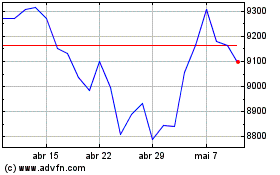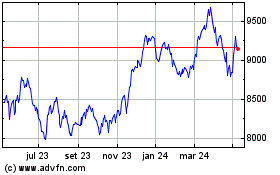London Stock Exchange Rejects Bid From Rival Hong Kong Exchange -- 2nd Update
13 Setembro 2019 - 1:22PM
Dow Jones News
By Margot Patrick
LONDON -- London Stock Exchange Group PLC on Friday rejected a
$36.6 billion bid from Hong Kong Exchanges and Clearing Ltd.,
saying it had "fundamental concerns" about the price and Hong
Kong's long-term future as a financial gateway.
The U.K. operator said it remains committed to buying
financial-information and terminal company Refinitiv Holdings Ltd.,
a $14.5 billion deal it struck in July that would have been
scrapped if the Hong Kong exchange succeeded in its bid.
Shares in LSE were 2% higher after the rejection, having already
risen almost 6% on Wednesday after HKEX announced its unsolicited
offer, surprising investors. Analysts say HKEX could improve its
offer with a larger cash component, or that other exchanges may
want to bid for the London exchange.
A successful tie-up between LSE and HKEX looked like a long shot
to many analysts because of regulatory and political hoops. Hong
Kong is reeling from a summer of antigovernment protests that have
raised concerns about China's tightening grip on the financial
center. London is grappling with its own political upheaval in the
form of Brexit.
The history of the exchange business over the past decade is
riddled with failed cross-border deals. Many of these were blocked
by regulators out of concerns that a prized national asset would be
taken over by foreigners, or that the takeover would give the
combined company monopolistic pricing power in crucial financial
markets. Exchanges themselves have often failed to agree on deal
terms and how to structure a combined entity.
The bid from Hong Kong was the latest for LSE, which has become
a highly sought-after target for a range of suitors over several
years, attracting multiple bids and making multiple acquisitions of
its own. The group, which has been offering stock trading for more
than 200 years, now derives much of its value from data services
and the popularity of passive investing.
Revenue from LSE's clearing house and financial indexing
business far outstrips a 20% contribution from its more traditional
exchange businesses of floating companies and securities trading.
That was the big lure for the Hong Kong exchange group.
LSE's stock has soared ninefold in the past 10 years, compared
with a 47% rise in the FTSE 100 index of the U.K.'s largest
companies. It had risen 80% this year even before the HKEX
offer.
That performance sets it apart from other U.K. financial
companies such as banks whose stocks have been dragged down by low
interest rates and stricter regulation since the financial crisis.
In contrast, LSE has benefited from postcrisis rules pushing more
derivatives through its LCH clearing house and a boom in indexed
funds.
Tracing its roots to City of London coffee houses where
stockbrokers set up shop, LSE thrived as London established itself
as a global hub for company fundraising and trading. It floated its
own shares in 2000, and spent much of the next decade fending off
takeover attempts by rivals including Nasdaq and Deutsche Boerse
AG.
It has averaged a bid approach every 2 1/2 years since its
initial public offering, according to analysts at Berenberg
Bank.
But while British banks during the 2000s were multiplying in
value from global expansion and increased risk taking, the London
exchange was at threat of becoming obsolete. Its monopoly on
domestic stock trading was ended by a 2007 European Union directive
that paved the way for alternative trading platforms. It suffered
more and its shares slumped as company listings and trading volumes
collapsed after the financial crisis.
Xavier Rolet, who was LSE's chief executive between 2009 and
2017, is credited with reversing the decline and transforming the
company into a global force. He led the acquisition of around 25
companies, including LCH and the FTSE Russell financial indexing
business.
As of June 30, LSE's post-trade services made up 38% of its
GBP1.14 billion ($1.41 billion) in revenue, and information
services made up 39%.
In an interview Thursday, Mr. Rolet said his vision for LSE was
to deepen its role connecting companies, banks and investors
globally, and to let users pay for the products and pieces of
financial plumbing they needed access to, rather than making them
pay for bundled services at a single price.
"We wanted to be one of the two or three financial
infrastructure companies with the full set of products," Mr. Rolet
said. He predicted LSE will eventually have an American or Chinese
owner as the industry continues to consolidate.
His successor, David Schwimmer, set three goals for the group:
to expand globally, become more diversified by asset class and
bolster its data analytics business. In August, Mr. Schwimmer said
the plan to buy Refinitiv, which supplies market information and
operates foreign-exchange and bond trading platforms, addresses all
of those ambitions.
LSE's earlier smart bets made the Refinitiv bid possible, since
it has a strong share price to use as currency, said Chris Turner,
a senior equity analyst at Berenberg. The planned purchase, agreed
with Refinitiv's shareholder Blackstone Group, shot LSE stock up
30%.
"That's the problem for Hong Kong exchange. Now you need to pay
a premium over that premium. It's too expensive now for others,"
Mr. Turner said.
Write to Margot Patrick at margot.patrick@wsj.com
(END) Dow Jones Newswires
September 13, 2019 12:07 ET (16:07 GMT)
Copyright (c) 2019 Dow Jones & Company, Inc.
London Stock Exchange (LSE:LSEG)
Gráfico Histórico do Ativo
De Mar 2024 até Abr 2024

London Stock Exchange (LSE:LSEG)
Gráfico Histórico do Ativo
De Abr 2023 até Abr 2024
